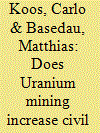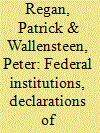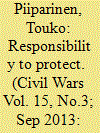|
|
|
Sort Order |
|
|
|
Items / Page
|
|
|
|
|
|
|
| Srl | Item |
| 1 |
ID:
126445


|
|
|
|
|
| Publication |
2013.
|
| Summary/Abstract |
This article investigates the relationship between power-sharing institutions and the durability of peace after negotiated settlements, employing statistical analyses on a large N data-set of peace agreements signed between 1989 and 2008. In contrast to recent studies which rely on a singular measure of 'political' power-sharing, post-settlement government institutions are empirically evaluated in terms of five key dimensions - executive-level coalitions, legislative proportionality, minority veto powers, military pacts and territorial decentralization. Contrary to the prevalent view that elite power-sharing pacts are key components for stability, the hazard-rate models reveal that executive power-sharing is a particularly unstable form of post-conflict governance. Instead, institutional options that separate belligerent parties and preserve their autonomy, such as territorial power-sharing and proportionality in the military forces, are the most significant predictors of settlement success. It is postulated that executive-level power-sharing is ineffective for stabilizing peace because disputants without genuine intentions of cooperation can enter these coalitions at a low cost.
|
|
|
|
|
|
|
|
|
|
|
|
|
|
|
|
| 2 |
ID:
126444


|
|
|
|
|
| Publication |
2013.
|
| Summary/Abstract |
We investigate whether uranium, similar to other resources, is associated with armed conflicts. The analysis uses grid cells in Africa to test this hypothesis. Results from logistic regressions reveal that uranium operations are not an independent conflict risk; however, it is significantly linked to local conflict events when interacting with ethnic exclusion. The analysis is supplemented by process tracing in four countries, where armed conflict broke out after uranium operations started (DR Congo, Central African Republic, Niger and South Africa). We find substantial evidence for a link only in the case of Niger. Our results suggest that uranium promotes intrastate conflict only under specific circumstances.
|
|
|
|
|
|
|
|
|
|
|
|
|
|
|
|
| 3 |
ID:
126442


|
|
|
|
|
| Publication |
2013.
|
| Summary/Abstract |
Countries at civil war differ across a number of dimensions that are often used to account for onset, duration or severity. A relatively understudied dimension is the role of institutional arrangements on the severity of civil wars. We argue that federal systems put in place the mechanisms to make civil wars shorter but bloodier because they often allow for independent militia, taxation, and infrastructural development. Federal systems also make more credible a declaration of independence. These factors make civil wars looks much more like conventional warfare than their guerilla-based counterpart. We rely on the cases of Yugoslavia and the United States to build and describe our arguments and then we test our arguments against cross national data from the 20th century civil wars. Our results provide insights into the role of institutional arrangements on the management of internal conflicts and suggest that further research could make an important contribution to our understanding of civil wars.
|
|
|
|
|
|
|
|
|
|
|
|
|
|
|
|
| 4 |
ID:
126443


|
|
|
|
|
| Publication |
2013.
|
| Summary/Abstract |
This article investigates the military approach as a means of solving protracted civil conflicts, in particular focusing on the cases of Sri Lanka and Colombia in comparison. The approach adopted is to study the emergence of these military options within the context of each country's history and to assess whether the call for war was merely a consequence of the international 'war on terror', or driven by internal elements. The article explores the epistemological groundings and pitfalls of the all-out war theory informing this approach, before reassessing the significance and validity of the theory in relation to Sri Lanka and Colombia.
|
|
|
|
|
|
|
|
|
|
|
|
|
|
|
|
| 5 |
ID:
126447


|
|
|
|
|
| Publication |
2013.
|
| Summary/Abstract |
The principle of Responsibility to Protect (RtoP) requires states and international society as a whole to protect civilians from genocide, crimes against humanity, war crimes and ethnic cleansing. This article argues that, instead of considering RtoP as a continuum to the humanitarian intervention doctrine aimed at performing limited protection tasks, RtoP might best be understood as a form of another doctrine which has been recently emerging in global conflict management, namely sovereignty-building. The main value added of this methodological shift resides in its potential to show that RtoP involves not only limited functions of short-term rescue and protection of civilians from immediate physical harm but also more long-term and ambitious efforts aimed at building responsible sovereigns and transforming societies. RtoP projects two kinds of images of responsible sovereignty on weak, fragile and failed states: the 'Bodinian' image, which implicates institution-building, reconstruction and empowerment of societies emerging from civil war and the 'Lockean' image, which refers to attempts to socialise states to a global human rights culture, by means of collective peer pressure, political and diplomatic means, and the use of coercive force, as demonstrated by military interventions in Libya and Côte d'Ivoire in 2011. This article argues that the sovereignty-building paradigm embodied in RtoP also involves potential pitfalls: it gives an opportunity for sub-state actors such as rebel groups to manipulate RtoP as an instrument (or weapon) to enhance their own political objectives in civil wars against incumbent national authorities.
|
|
|
|
|
|
|
|
|
|
|
|
|
|
|
|
| 6 |
ID:
126446


|
|
|
|
|
| Publication |
2013.
|
| Summary/Abstract |
Contemporary understandings of rape in wartime emphasise its strategic deployment as a weapon of war. One of the most prominent cases in the discourse has been the Sierra Leone Civil War and its Revolutionary United Front (RUF) rebel group. This article complements the existing literature by examining war-related sexual violence from within the rebel group itself, exploring how sexual violence was used and understood by fighters. Counter-intuitive to received wisdom that the RUF instrumentalised rape systematically, extensive interview and archival material show that there were harshly inculcated, but ultimately ineffective policies aimed at preventing rape. These laws were central to the RUF's attempts to manage organisational control and cohesion. This calls for revisiting and revising the 'rape as a weapon of war' framework if it is to have explanatory power for the causes and mechanisms of gender violence in war.
|
|
|
|
|
|
|
|
|
|
|
|
|
|
|
|
|
|
|
|
|